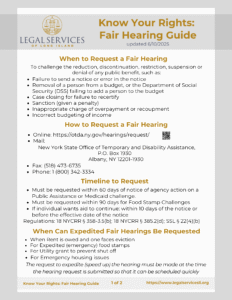
Housing Insecurity Prevention Assistance Programs Open
July 3, 2025
Read About LSLI’s Education Disability Rights Project’s Current Work and Recent Success Stories!
July 18, 2025Please see our Fair Hearing Guide to help you understand your rights if you need to request a Fair Hearing for a decision by the Department of Social Services.
Download Guide In English
When to Request a Fair Hearing
To challenge the reduction, discontinuation, restriction, suspension or denial of any public benefit, such as:
- Failure to send a notice or error in the notice
- Removal of a person from a budget, or the Department of Social Security (DSS) failing to add a person to the budget
- Case closing for failure to recertify
- Sanction (given a penalty)
- Inappropriate charge of overpayment or recoupment
- Incorrect budgeting of income
How to Request a Fair Hearing
- Online: https://otda.ny.gov/hearings/request/
- Mail:
New York State Office of Temporary and Disability Assistance
P.O. Box 1930
Albany, NY 12201-1930
- Fax: (518) 473-6735
- Phone: 1 (800) 342-3334
Timeline to Request
- Must be requested within 60 days of notice of agency action on a Public Assistance or Medicaid challenge.
- Must be requested within 90 days for Food Stamp Challenges
- If individual wants aid to continue: within 10 days of the notice or before the effective date of the notice
- Regulations: 18 NYCRR § 358-3.5(b); 18 NYCRR § 385.2(d); SSL § 22(4)(b)
When Can Expedited Fair Hearings Be Requested
- When Rent is owed and one faces eviction
- For Expedited (emergency) food stamps
- For Utility grant to prevent shut off
- For Emergency housing issues
The request to expedite (speed up) the hearing must be made at the time the hearing request is submitted so that it can be scheduled quickly
Appellant Rights: Receiving Notices
- Applicants must receive adequate notice of a denial of benefits
- Recipients must receive timely and adequate notice when the Department of Social Services (DSS) intends to change an existing grant
Appellant Rights at the Hearing
- Be heard in a meaningful manner and state their position orally (give testimony)
- Review the evidence the DSS submits at the hearing and may ask for copies of the evidence (the Administrative Law Judge [ALJ] will allow copies to be made afterward)
- Bring necessary witnesses and question the other side’s witnesses (including the Agency’s representative)
- Be represented by counsel or a representative, or proceed unrepresented
- Make opening or closing statements.
- Make objections to the relevance of evidence, hearsay (witness repeats what someone else said), personal knowledge, or to procedures.
- Have an impartial decision maker (the ALJ) make a conclusion resting solely on the evidence brought forth at the hearing.
Fair Hearing Decisions
- Fair Hearing Decisions 18 NYCRR § 358-6.1
- Decision must be based exclusively on the fair hearing record, or in case of decision without hearing, on documents submitted by Appellant and DSS
- Decision is final and binding on DSS
- Office of Administrative Hearings (OAH) will mail a copy of the Decision after the Fair Hearing to Appellant and the Appellant’s representative
- Redacted fair hearing decisions are available here: https://otda.ny.gov/hearings/search/
Last Updated July 18th, 2025. The information contained in this material is not legal advice. Legal advice depends upon the specific facts of each situation. Also, the law may vary from state to state, so some information from our website may not be correct for your jurisdiction. Finally, this information is not guaranteed to be up to date. The material contained on this site cannot replace the advice of competent legal counsel licensed in your state.



